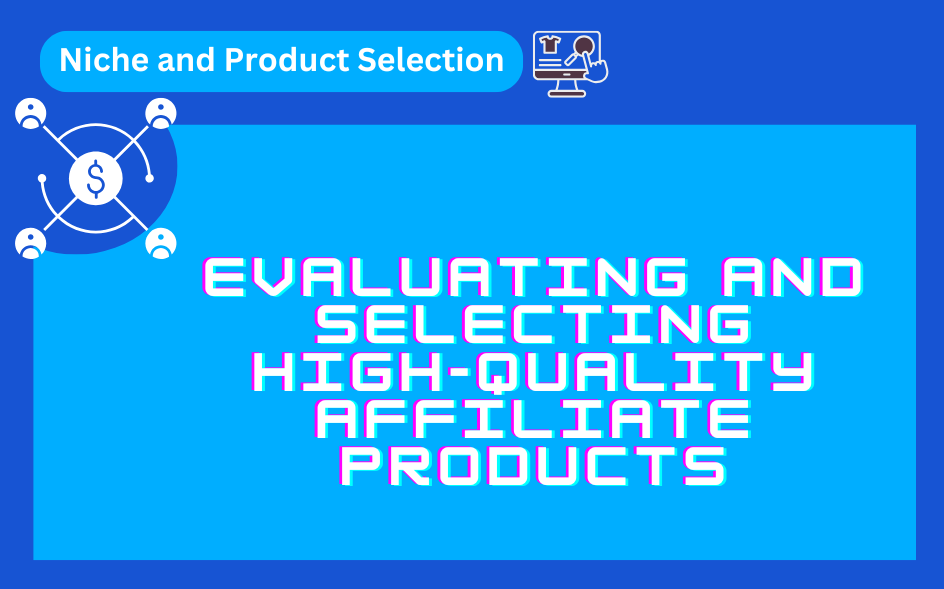Affiliate marketing can be an incredibly rewarding way to generate income online, but your success largely depends on the products you promote. Selecting high-quality affiliate products ensures you build trust with your audience, improve conversion rates, and achieve long-term success. This guide will walk you through the essential steps to evaluate and select top-notch affiliate products.
1. Understand Your Audience
Why Knowing Your Audience Matters
Before promoting any product, it’s crucial to understand who you’re targeting. Your audience’s needs, pain points, and desires will dictate the type of products that are most relevant.
- Demographics: Age, gender, location, and other factors that define your audience.
- Interests and Problems: What are their hobbies, challenges, or goals?
- Buying Behavior: Are they budget-conscious, or are they willing to invest in premium products?
How to Identify Audience Needs
- Surveys and Polls: Ask your audience directly what they need.
- Social Media Insights: Analyze the conversations your audience is having.
- Google Analytics: Check your website traffic to see what content performs best.
2. Ensure the Product Solves a Problem
The Value Proposition
A high-quality affiliate product should provide a solution to a real problem. Ask yourself:
- Does this product fulfill a need or solve a problem my audience is facing?
- What specific benefits will my audience receive from using this product?
Products that deliver value will naturally have higher conversion rates and lower refund rates.
3. Check Product Quality and Credibility
How to Evaluate Quality
Never promote a product you wouldn’t use yourself. Some ways to ensure quality include:
- Test the Product: Whenever possible, use the product yourself.
- Read Customer Reviews: Check platforms like Amazon, Trustpilot, or review forums to gauge satisfaction.
- Check for Guarantees: Products with warranties or money-back guarantees indicate confidence in quality.
Assess the Brand or Creator
Research the company or individual behind the product:
- Reputation: Do they have a good reputation online?
- Transparency: Do they clearly state what’s included and the benefits of the product?
- Customer Support: How responsive and helpful is the support team?
4. Analyze the Product’s Earning Potential
Key Metrics to Consider
Not all products are equally profitable. Evaluate the earning potential by looking at:
- Commission Rate: What percentage of each sale do you earn?
- Average Sale Price: Higher-priced items generally yield higher commissions.
- Conversion Rate: How well does the product convert traffic into sales?
- Recurring Revenue: Does the product offer subscription-based earnings?
Example of a Good Earning Potential
- High Commission: 30% per sale
- Average Sale Price: $100
- Proven Conversion Rate: 5%
- Recurring Income: Monthly subscriptions or renewals
5. Evaluate Market Demand and Competition
Gauging Product Demand
- Google Trends: See if interest in the product or niche is increasing.
- Keyword Research: Use tools like Ahrefs, Semrush, or Google Keyword Planner to check search volume.
- Sales Rank: Check how well the product is selling on platforms like Amazon or ClickBank.
Analyze Competition
- Number of Competitors: A highly competitive market can make it harder to stand out.
- Unique Selling Point (USP): Does the product offer something different from competitors?
6. Check the Affiliate Program Terms
Things to Look For in Terms and Conditions
- Cookie Duration: How long do you have to make a sale after someone clicks your link? Longer durations (e.g., 30-90 days) are better.
- Payout Methods and Frequency: How often do you get paid, and what payment methods are available?
- Minimum Payout Threshold: How much do you need to earn before you can withdraw?
7. Look for High-Quality Marketing Resources
Why Marketing Resources Matter
Some affiliate programs provide ready-made marketing materials such as:
- Banners and Graphics: Professional images you can use on your blog or social media.
- Email Templates: Pre-written email sequences for promotions.
- Content Samples: Sample blog posts or product descriptions.
These resources save you time and help boost conversions.
8. Consider Long-Term Potential
Is the Product Evergreen?
Evergreen products remain relevant over time. For example:
- Health and Wellness: Fitness programs, supplements, or meal plans.
- Business Tools: Software for marketing, accounting, or project management.
Promoting evergreen products can provide consistent income for years.
9. Assess Ethical and Moral Considerations
Promote Products You Believe In
Your audience trusts your recommendations. Avoid promoting products that:
- Are low quality or scammy.
- Make false promises.
- Have negative environmental or social impacts.
Your integrity is key to building a sustainable affiliate marketing business.
10. Track Performance and Optimize
Use Analytics Tools
- Google Analytics: Track where your traffic comes from and what converts best.
- Affiliate Dashboard: Most affiliate programs offer data on clicks, sales, and commissions.
- A/B Testing: Test different promotional methods to see what works best.
Continuous Improvement
- Double Down on Top Performers: Focus on products that convert well.
- Drop Low Performers: If a product isn’t converting, consider replacing it.
Final Thoughts
Choosing high-quality affiliate products is essential for building trust, boosting conversions, and ensuring long-term success. By following these guidelines, you’ll be better equipped to evaluate and select products that align with your audience’s needs and your business goals.
Happy promoting!















